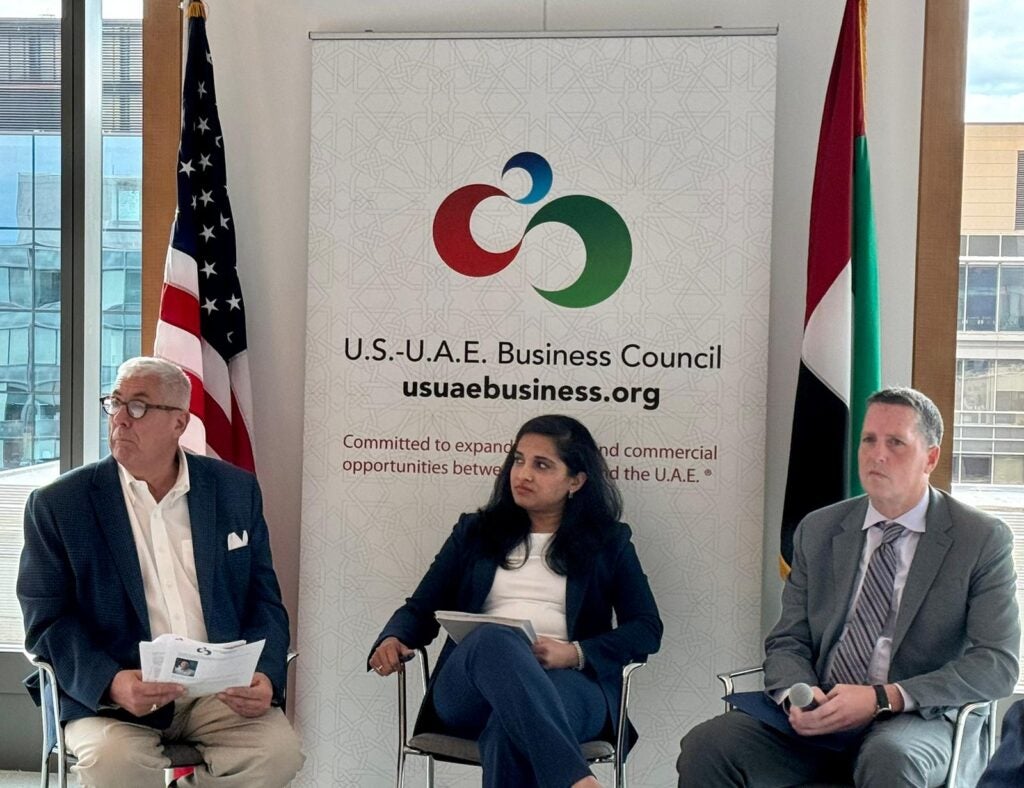
The U.S.-U.A.E. Business Council hosted a conversation on Thursday, April 18, 2024, with officials from the U.S. Department of Commerce’s Bureau of Industry and Security (BIS). The luncheon was held as part of the Artificial Intelligence (AI) Task Force of the Business Council’s Digital Policy Working Group and built upon discussions from the previous AI Task Force meeting held in Dubai in February 2024. The U.S.-U.A.E. strategic technology relationship has ascended new heights in recent months with a number of new cooperation announcements. The U.S. Department of Commerce’s BIS is leading U.S. government efforts to work closely with the U.A.E. government to develop and implement procedures that facilitate protection of U.S. technology.
In his opening remarks, Business Council President Mr. Danny Sebright reviewed key recent developments in the U.S.-U.A.E. strategic technology relationship including:
- IBM and G42 Cloud signed a partnership to explore ways of supporting government and enterprises accelerate their digital transformation journey.
- OpenAI and G42 signed a partnership that will leverage OpenAI’s generative AI models in domains where G42 already has deep expertise.
- Cerebras and G42 signed a deal to create a new supercomputer in the U.A.E. for training purposes.
- Amazon Web Services and Core42 signed a partnership agreement to boost the U.A.E.’s digital transformation.
- Microsoft announced a $1.5 billion strategic investment in G42 to co-innovate and deliver advanced AI solutions with Microsoft Azure for various industries and markets across the Middle East, Central Asia and Africa.
Mr. Talal Kaissi, EVP and Chief Product and Global Partnerships Officer at Core42, thanked the U.S. Department of Commerce’s BIS for their close cooperation which enabled these agreements to be implemented.
Mr. Sebright then introduced Ms. Aiysha Hussain, Senior Policy Advisor to Assistant Secretary of Bureau of Industry and Security for Export Administration Thea Kendler. She outlined the mandate of BIS and noted that the primary responsibility is to safeguard U.S. national security and foreign policy. She underscored that BIS Export Administration develops and implements export control regulations that govern the export of dual-use technologies. She mentioned that BIS identifies dual-use technologies that may pose a threat to U.S. national security and institutes a robust licensing system. Ms. Hussain emphasized that BIS works collaboratively at the multilateral level to accomplish its aims. She cited the implementation of the Global Export Control Coalition (GECC)after Russia’s invasion of Ukraine as a successful example of BIS’ engagement of allies and partners. She clarified that BIS also works outside the multilateral arena and implements requirements unilaterally when necessary for protection of U.S. technology. .
Ms. Hussain highlighted the ways that BIS engages with the private sector, especially through its Technical Advisory Committees (TACs) which provide a platform for industry to provide input on proposed regulations. She invited U.S. companies interested in more dialogue with the U.S. government on these issues to apply for membership in the TACs. She mentioned that the TACs comprise a wide range of stakeholders, including startups, ensuring that BIS receives feedback from all relevant stakeholders. She added that companies can also provide feedback through public comments. Ms. Hussain assured industry representatives that BIS’ objective is not aimed at restraining economic growth but to safeguard sensitive U.S. technology.
Mr. Aaron Amundson, Director of the Information Technology Controls Division at BIS, added that the goal of the TACs is to ensure that companies have a say in export control policy and have a mechanism to provide feedback regarding the impact of BIS policies on new technologies. He mentioned collaboration with U.S. allies as another important feedback loop for BIS with regard to new export controls.
Mr. Amundson discussed the evolution of BIS’ export control regime with respect to AI. He noted that BIS has long-standing controls on high performance computing dating back decades. These controls were designed to capture supercomputers that were used in national security applications such as nuclear simulation. In 2018, BIS first identified AI as an emerging technology that needed to be studied further. Mr. Amundson remarked that BIS determined, after interagency discussions, that the best candidate for controls was the hardware and computing power of AI, and subsequently began to look at the parameters for controlling this aspect of AI. He recounted that BIS originally sought to target the high-end AI processors, but later expanded regulations to control most chips that could be useful for AI training purposes. He clarified that the most stringent controls regarding the Middle East are targeted at D:5 countries, which are countries subject to U.S. arms embargo, and emphasized that, for most of the Middle East, only exporting high-end chips require a license.
Highlighting the interagency process involved in the issuance of licenses, Mr. Amundson encouraged companies to engage other departments of the interagency process early. He recommended that companies experiencing licensing delays take a holistic approach and engage with other stakeholders involved in the interagency review process such as the Department of State, Department of Defense, and Department of Energy. He noted some licenses take longer than others depending on the scope and scale of the business activity. Ms. Hussain also advised that companies contact other departments to learn more about the nature of any delays.
Ms. Hussain called the U.S.-U.A.E. partnership a vital and multi-faceted relationship. She labeled the U.A.E. as a leader in instituting their own strategic trade and export controls. She underscored that instituting strategic trade control attracts U.S. businesses and ensures a safe environment in which U.S. industry can operate. Ms. Hussain encouraged businesses to keep the lines of communications open and continue to engage with BIS.
For questions about the Business Council’s work in the technology sector and the Business Council’s AI Task Force, please contact Amira Siddiqi at asiddiqi@usuaebusiness.org.